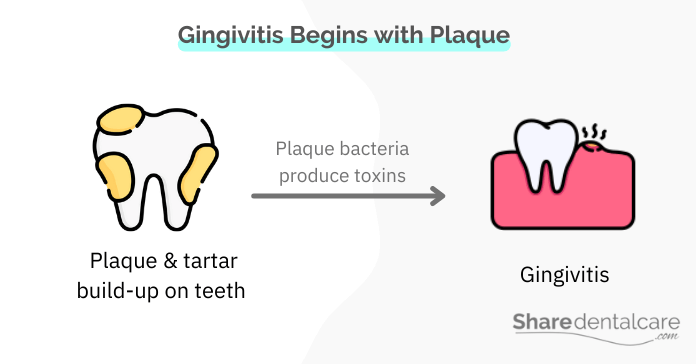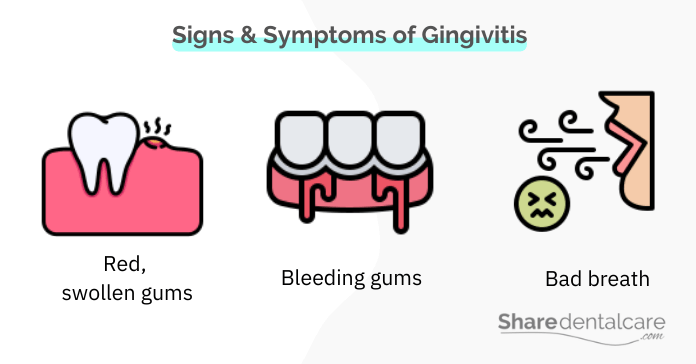Gingivitis is an infection of the gums that can spread to tooth-supporting tissues if left untreated. It is usually caused by dental plaque, which is a sticky film of bacteria that accumulates on your teeth every day. Dental plaque can irritate your gum tissue, causing gingivitis. If left untreated, the infection may spread to the tooth-supporting tissues, leading to tooth loss. I this blog post. we will discuss how you get gingivitis, its signs & symptoms, and how to prevent it from happening.
What is Gum Disease & Its Stages?
Gum disease, also known as periodontal disease, is an infection of the gums and tissues that support the tooth. It is a progressive disease, which means it gets worse over time if left untreated. There are two stages of gum disease:
- Gingivitis: gingivitis infection is the earliest stage of gum disease and is characterized by red, swollen, and bleeding gums. It usually doesn’t cause pain at this stage.
- Periodontitis: This is the more advanced stage of gum disease and is characterized by gum recession, which leads to deep pockets between teeth that collect plaque and bacteria leading to bone loss around the tooth. This condition causes chronic pain and can lead to tooth loss if left untreated for a long time. Read more about the differences between gingivitis vs periodontitis.
According to the Centers for Disease Control & Prevention (CDC), 47% of adults aged 30 years and older get some form of gum disease (gingivitis or periodontitis).
How Do You Get Gingivitis?
Dental plaque is a sticky film of bacteria that accumulates on your teeth every day. These bacteria decompose carbohydrates and produce acids that irritate the gums, causing gingivitis. Poor oral hygiene is one of the most common factors that promote plaque buildup on teeth and the growth of bacteria. Also, other factors can cause you to get gingivitis.

Causes & Risk Factors
Several factors can cause you to get gingivitis, including:
- Poor oral hygiene: One of the main causes of getting gingivitis is poor oral hygiene. If you don’t brush and floss your teeth regularly, plaque will build up on your teeth and irritate your gum tissue.
- Smoking: Smoking is another major risk factor for gum disease. It causes plaque to build up on teeth more quickly, and the nicotine in cigarettes can irritate the gums, causing you to get gingivitis. Read more about gum disease from tobacco.
- Age: gum disease is more common in adults than in children. As you get older, your gums become less resistant to infection and are more likely to develop gingivitis.
- Hormonal changes: Women are more likely to get gingivitis than men because hormonal changes during the menstrual cycle and pregnancy can promote plaque buildup. Read more about pregnancy gingivitis.
- Genetics: Some people are simply more predisposed to getting gum disease than others. If you have other family members with gum disease, you face a higher risk of developing it yourself.
- Dry mouth: Your saliva helps wash away food and bacteria from your teeth. Saliva also contains antibacterial substances that keep the gums healthy by reducing bacterial growth. If you don’t produce enough saliva, this can lead to plaque buildup and gum disease.
- Diabetes: People with diabetes have a higher risk of gum disease than people without diabetes because the high blood sugar levels in diabetes can damage the gums.
- Medications: Some medications, such as anti-seizure drugs and oral contraceptives, can increase your risk of getting gum disease.
How Do You Know You Have Gingivitis?
If you have the following signs and symptoms, you should see your dentist or periodontist (gum specialist) for an exam and get treatment. If the disease is detected early, you can avoid serious complications by getting proper treatment. The signs & symptoms include:
- Red, inflamed gums that may bleed when brushing your teeth.
- Swollen or puffy gums.
- Tender or sensitive gums.
- Chronic bad breath or sour taste in the mouth.
- Receding gums and infected gum pockets.

How Can You Get Rid of Gingivitis?
The good news is that the early stage of gum disease is reversible and can be treated by professional teeth cleaning and improving your oral hygiene, including:
- Brush your teeth twice a day with ADA-accepted fluoride toothpaste.
- Floss at least once a day, or use an interdental cleaner to remove plaque from between your teeth.
- Prevent dry mouth by drinking plenty of water throughout the day.
- If you’re a smoker, quit or at least smoke in moderation. Read more about smokers gums treatment.
- Schedule regular dental checkups and professional teeth cleanings every six months.
If gingivitis is left untreated, the infection may progress to the tooth-supporting tissues, and you can get periodontitis, which is an advanced stage of gum disease. Periodontitis can cause tooth loss and other serious health problems.
So, if you think you get gingivitis, it is important to see your dentist as soon as possible for diagnosis and treatment. With proper care, you can get rid of gingivitis and keep your teeth and gums healthy.
You can read more about how to reduce gum pockets naturally.
How Do You Get Gingivitis – Conclusion
In conclusion, several things can put you at risk for getting gingivitis, including poor oral hygiene, smoking, age, hormonal changes, genetics, and diabetes. If you have the signs and symptoms of gingivitis, you should see your dentist as soon as possible to get suitable treatment and prevent the spread of infection. With proper care, you can get rid of gingivitis and keep your teeth and gums healthy.